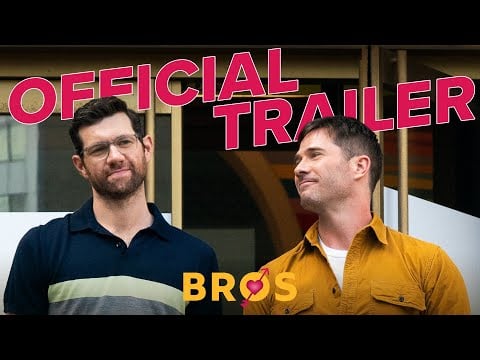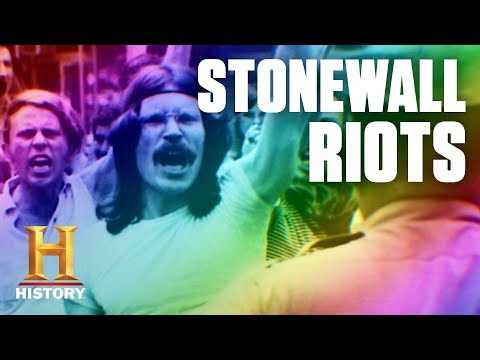The release of “Bros” has been greeted with celebratory articles and reviews, promoted as the first “gay rom-com” from a major studio (Universal).
The main character is Bobby (Billy Eichner), the flamboyant, outspoken director of a fledgling LGBTQ+ history museum who struggles with commitment issues in a culture that apparently emphasizes random sexual encounters over close relationships.
He soon meets Aaron (Luke Macfarlane), a hunky lawyer with his own commitment issues. The film chronicles their rocky courtship in a broad, raunchy comic style.

Despite critical acclaim, many gay men, myself and others, were not only underwhelmed by the film, but found it to be, well, basically awful.
As scripted by Eichner and director Nicholas Stoller, the film posits an ideology that represents a very narrow section of the community, one that isn’t gay, but rather “LGBTQ+” or, more specifically, “queer.”
The story demonizes regular gay men and rewrites gay history in the process.
Let’s address that historical revisionism in the film.
As part of his attempt to get the LGBT+ History Museum off the ground, Bobby wants to emphasize the idea that Abraham Lincoln was gay, based on the fact that Lincoln shared a bed with his friend Joshua Speedman. The president also wrote affectionate letters to him.
Other characters correctly push back on Bobby’s interpretation, pointing out there’s no evidence of a sexual relationship between the two men and that, more likely, they were just close friends, in a 19th century manner that is different than the way straight men express affection now.
But when it comes to actual gay history, the film embraces a facile understanding of the past that is more in line with the “queer” revisionism of the recent era than that which truly happened.

The Stonewall Riots are mentioned a few times, and while, to the film’s credit, it points out that we don’t know who threw the first brick (if there even was a “first brick”), when the scepters of Marsha P. Johnson and Sylvia Rivera are raised, Bobby tells Aaron something along the lines of “we owe our rights to transwomen of color.”
It’s a commonly repeated myth about the history of the gay rights movement, which often conflates tales of Johnson and Rivera being present at the opening salvos of Stonewall and starting Pride.
However, as recent interviews with Jim Fouratt and Fred Sargeant – veterans of the gay rights movement from the 1960s forward and who were both there at the Stonewall Riots from the start – point out, neither Johnson nor Rivera were present when the action kicked off. They were active in gay organizations in the early 1970s, but that participation was limited in scope.
It’s worth noting Sargeant actually did co-create the first Pride parade, with his boyfriend at the time, Craig Rodwell, along with lesbians Ellen Broidy and Linda Rhodes.
Johnson’s role as a transgender icon is muddied by the fact that he was a self-declared gay man who was a transvestite, meaning that he merely expressed himself through drag without actually claiming to be a woman.
View this post on Instagram
Not mentioned are pre-Stonewall figures like Karl Heinrich Ulrichs (the first man to come out as a political act, in 1867) or Frank Kameny (the first gay man to file a civil rights claim based on sexual orientation, in 1958), or later figures like Leonard Matlovich (the first gay service member to fight the ban against gay men serving in the US military, in 1975).
This is of a piece with the film’s ideological slant, which is entirely positioned from the LGBTQ+ or queer philosophy, which rejects the larger, mainstream culture as “heteronormative” and oppressive.
Anger and resentment against the larger culture runs through the film. Consider a revealing moment when Bobby bitterly recounts events from his youth when authority figures in the form of acting teachers pointed out to him that his flamboyant, camp mannerisms will likely restrict the type of roles he will be able to play.
The script lets this indignation spill into the rest of the film, as not only does Bobby express his disdain at Aaron and Aaron’s high school friend Josh (Ryan Faucett) for being masculine gay men, but they’re also basically dismissed as not being the right kind of gay man.
They’re not “queer.”
This is something that is an increasingly common feature in the real world, where gay men who do not subscribe to the TQ+ ideology are demeaned, often in a very hateful way. To see it play out in a “gay rom-com” is disheartening and even insulting.
Artistically, “Bros” is not particularly impressive: there are only a few intermittent laughs, most of which are throw-away gags rather than the wit and humor that would originate from characters of genuine depth. Stoller’s direction is bland and uninspired.
Despite the critical acclaim and the pervasive advertising, the movie flopped on its opening weekend, earning just $4.8 million against a $22 million budget – and that was 40 percent less that what Universal was expecting.
Eichner responded to the disappointing figures by blaming homophobia, but plenty of gay men stayed away, too.
That’s just the world we live in, unfortunately. Even with glowing reviews, great Rotten Tomatoes scores, an A CinemaScore etc, straight people, especially in certain parts of the country, just didn’t show up for Bros. And that’s disappointing but it is what it is.
— billy eichner (@billyeichner) October 2, 2022
Perhaps if he had made a film that wasn’t so infused by an angry, resentful ideology, and focused instead on creating a witty film populated by relatable, genuine characters, audiences, and notably gay audiences, may have responded more warmly.
Joseph Jones has a degree in History from the University of South Florida and has been a movie buff all his life. He lives in the Dallas-Fort Worth area.
The post Why ‘Bros’ Failed: Bogus History, Cultural Resentment appeared first on Hollywood in Toto.

0 Comments